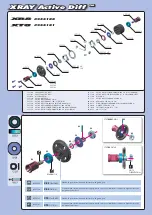
Visit
www.modelflight.com.au
for more information and spare parts online.
Saftey Precautions
This is a sophisticated radio controlled model that must be operated with caution and common
sense.
Failure to operate your Mini-T Pro in a safe and responsible manner could result in damage to the
model and property. The Mini-T Pro is not intended for use by children without direct supervision.
Team Losi and Horizon Hobby shall not be liable for any loss or damages, whether direct, indirect,
Recommended Servos
Installing the Servo
Be sure that
the taller pin
special, incidental, or consequential, arising from the use, misuse, or abuse of this product or any
product required to operate it.
This model is controlled by a radio signal that is subject to interference from many sources
outside your control. This interference can cause momentary loss of control so it is advisable to
always keep a safety margin in all directions to aviod collisions.
Always operate your model in an open area away from cars, traf
!
c and people
Never run out into the street for any reason.
Never run your Mini-T Pro with low transmitter batteries
Carefully follow the directions and warnings for this and any optional support equipment (char-
gers,
rechargable battery packs, etc.) that you use.
Keep all chemicals, small parts and anything electrical out of the reach of children.
Required Equipment
Airtronics
94091Z
HiTEC
HS-55
HiTec HS-55
JR Propo
S241MG
Expert Electronics
SL110
Airtronics 94091Z
Use this hole
to mount
servos listed
is at the top
JR Propo S241MG (Metal Gear)
2 Channel Radio System with Receiver
Electronic Speed Controller
Micro size Servo
Battery and Charger
Radio Installation
You will need a receiver, electronic speed control (ESC), and micro steering servo to complete
your Mini-T Pro. If you do not already have these we suggest you use one of the newer smaller
receivers and ESC’s as it will be easier to
!
t these in the space available. All of the popular radio
manufactures as well as Novak, GM Racing and LRP offer these items. We show mounting four of
the most popular steering servos. Please note that in most cases we suggest the use of a servo
saver as noted.
1) Cut a piece of double sided mounting tape to
!
t the bottom of both the receiver and ESC. Re-
move the paper backing from one side and apply to the bottom – Do Not remove the remaining
backing yet!
2) Test position the receiver and ESC on the top surface of the battery plate checking for adequate
clearance and convenient access for all wiring. Mark or note these positions before proceeding.
3) Remove the protective backing from the mounting tape on the receiver and ESC. Carefully
Carefully using a hobby
knife, remove shaded
material to open servo
mounting hole as shown.
Do this modi
!
cation on
both mounting “ears”.
To install this servo, use the included
Mini-T Servo Saver Kit and make
modi
!
cations to servo as pictured
above.
To install this servo you will need to
purchase the Airtronics 98302 Micro
Servo Saver kit.
Expert Electronics SL110
To install this servo, use the included
Mini-T Servo Saver Kit.
At the time of this printing, a servo
saver was not available. Using only the
Metal geared version, follow the steps to
modify the servo horn.
LOSA6215 #4 Narrow Washer
To install this servo, you will need to pur-
chase LOSA6215 #4 Narrow Washer to
space the mounting screw as pictured above.
mount them on the battery plate.
Final Connections
Follow the radio manufactures instruc-
tions when making the
!
nal electronic
connections. Speci
!
cally, the orienta-
tion of the color-coded wires in the
various plugs where they plug into the
receiver. If you plan on removing the
wires attached to the motor mark the
endbell with a “+” at the red wire and “-“
at the black wire for future reference.
Follow the radio instructions to set the
proper steering and throttle movement.
Follow the instructions included with the
ESC for correct operation.
Sample picture of electronics installed in the Mini-T Pro
Install the Servo into the Chassis as shown in
Figure 1
. Insert the pins on the Servo Mounting
Post into the holes in the Chassis. Move the Servo Posts slightly until both the left and right Posts
are inserted in the holes in the Chassis. Next place the Chassis Brace on top of the Servo. The
pins from both Servo Mounting Posts should line up with the holes on the Servo Brace. If they do
not, move the Posts slightly until the pins
!
t into the holes. Secure the Brace to the Chassis with
the four Phillips head screws as shown in
Figure 2
.
Figure 1
Figure 2























